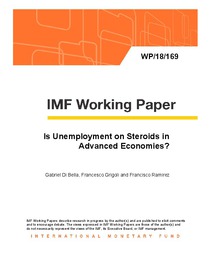Is unemployment on steroids in advanced economies?

Di Bella, Gabriel ; Grigoli, Francesco ; Ramirez, Francisco
IMF - Washington, DC
2018
33 p.
unemployment ; macroeconomics ; labour market
IMF Working Paper
WP/18/169
Unemployment
English
Bibliogr.
"Despite conventional macroeconomic theory is based on the idea that demand shocks can only have temporary effects on unemployment, several European economies display highly persistent unemployment dynamics. The theory of hysteresis challenges this view and points out that, under certain conditions, demand disturbances can have permanent effects. In this paper, we find strong empirical evidence of unemployment hysteresis in advanced economies since the 1990s. Relying on an identification scheme instigated by an insider/outsider model, we study the effects of demand shocks allowing for cross-country heterogeneous dynamics, and exploit such heterogeneity to investigate what institutional settings have the potential to soften or amplify the effects of demand shocks. Our results indicate that strengthening labor market institutions that promote a faster adjustment of real wages, removing disincentives for firms to hire and for workers to be employed, and improving the matching between labor supply and labor demand can lessen the effects of adverse demand shocks and lead to a faster reversion of unemployment rates to pre-shock levels."
Digital
The ETUI is co-funded by the European Union. Views and opinions expressed are however those of the author(s) only and do not necessarily reflect those of the European Union or the ETUI.